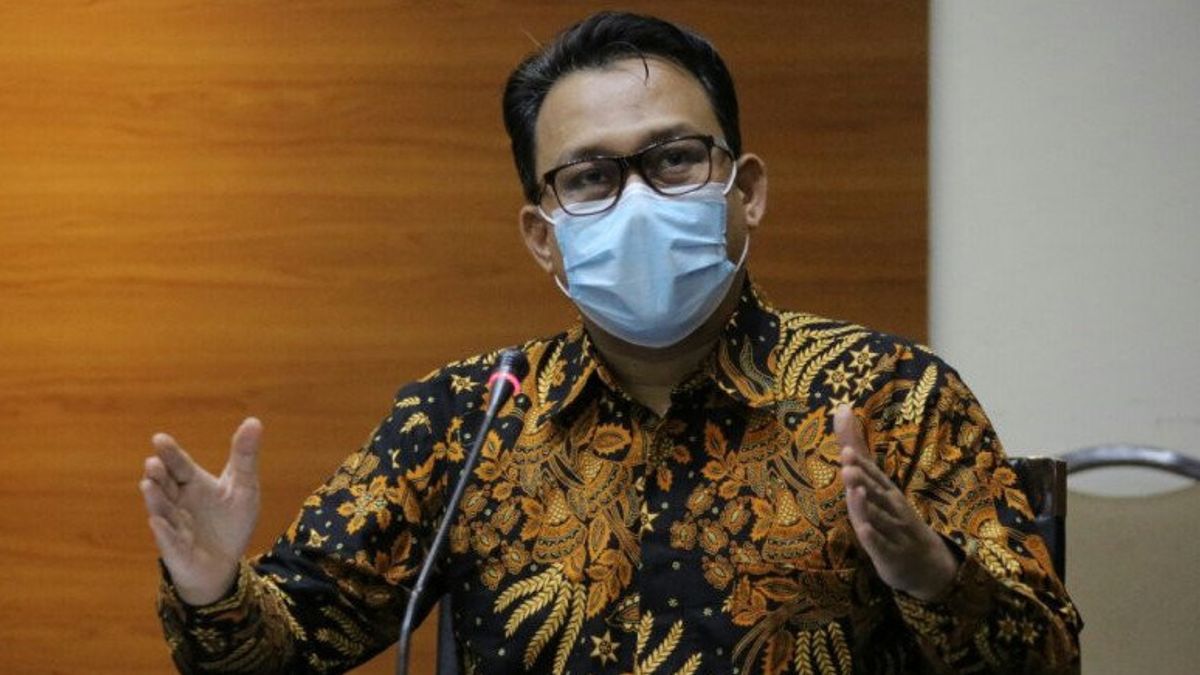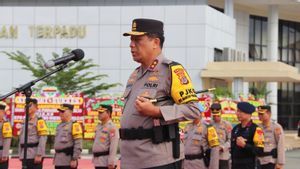JAKARTA - The Corruption Eradication Commission (KPK) has spoken about the assumption that the new internal structure of the institution is fattening with the existence of Commission Regulation (Perkom) Number 7 of 2020.
Acting KPK spokesman for prosecution Ali Fikri said it would be wrong if there were parties who thought the new structure in the KPK was now said to be fat and fatty.
"We need to convey that there are some parties who are wrong in understanding this structure, so we emphasize that it is not right that the current structure is said to be fat and fatty. Most of it is just a change in the name of the nomenclature so it does not add to the structure," Ali said in his written statement, Wednesday, 6 January.
He emphasized that through this regulation, the KPK only added a total of seven new positions consisting of six structural officials, namely one echelon I official, five echelon III equivalent officials, and one non-structural official, namely special staff.
This addition, he continued, also does not overlap because the addition of this new position also removes the old structural positions in various fields from deputy to secretary general.
"The addition is after taking into account the number of additional new positions, deleted old positions, and changing names / nomenclature of positions, both at the deputy and secretariat general. At the echelon I level there were two additional job names but one old position was removed, namely PIPM deputy. 2 there were 11 new positions added but also 11 old ones removed. Meanwhile, at the echelon 3 level there were eight new positions added and three old ones, "he explained.
Meanwhile, regarding the addition of two new positions at echelon I, namely Deputy for Coordination and Supervision and Deputy for Education and Community Participation, said Ali, in response to the mandate of Article 6 letters B and D related to the implementation of Coordination and Supervision duties and Article 7 paragraph (1). letters c, d and e of the KPK Law.
"The basis for the preparation of the Perkom is clear, namely Law Number 19 of 2019 concerning the KPK. The drafting of the Perkom has also gone through a long procedure including harmonization at the Ministry of Law and Human Rights (Kemenkumham)," he said.
As previously reported, Indonesia Corruption Watch (ICW) researcher Kurnia Ramadhana said the inauguration of dozens of new officials, six of whom came from the Bhayangkara Corps, were deemed to erode the independence of the anti-corruption commission.
He considered that after Firli was appointed chairman of the KPK, there was a new trend that occurred, namely the entry of high-ranking Police officers to fill structural positions in the anti-graft commission. This was proven by the presence of seven police officers at the director level, one at the deputy level.
"In general, the problem with the new structural KPK officials can be seen as an attempt by the leadership to play against institutional independence," said Kurnia in a written statement to reporters quoted on Wednesday, January 6.
Furthermore, he considered, the inauguration of dozens of new officials in the KPK structure was an act of abuse of authority by the leadership because of a problematic legal basis. The reason is, the change in the KPK regulations to Law 19 of 2019 was not followed by a change in the substance of Article 26 in Law 30 of 2002.
This means that the nomenclature of the KPK structure should still refer to Article 26 of Law 30 of 2002 as amended by Law 19 of 2019, namely the Prevention Sector, the Enforcement Sector, the Information and Data Sector, the Internal Control Sector and Public Complaints.
Thus, changes through Perkom 7/2020 which add new nomenclature such as the Deputy for Education and Community Participation, inspectorates, and special staff are considered to be contrary to Law 19 of 2019 and cannot be justified.
"This shows that the decision of the KPK leadership Number 1837/2020 concerning Appointment and Confirmation in High Leadership and Administrator Positions at the Corruption Eradication Commission is contrary to Law 19/2019 and cannot be justified," he said.
The English, Chinese, Japanese, Arabic, and French versions are automatically generated by the AI. So there may still be inaccuracies in translating, please always see Indonesian as our main language. (system supported by DigitalSiber.id)













